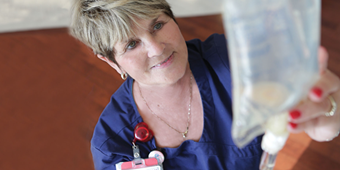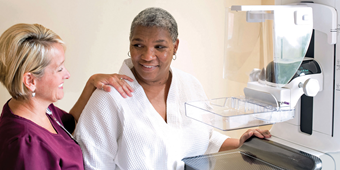Eat Your Way to a Lower Cancer Risk

Answer a few questions and we'll provide you with a list of primary care providers that best fit your needs.
“There is no magic food that prevents breast cancer, but eating healthy foods may reduce your risk while boosting your immune system and keeping your body strong,” says Premier Health Registered Dietitian Nutritionist Susan Knapke, RDN, LD. In fact, diet, weight and physical activity levels have all been linked to breast cancer. Luckily, they’re all areas where you can take action.
Focus on Healthy Eating
Stick to a diet high in vegetables, fruit, poultry, fish, whole grains and low-fat dairy products. Eating a diet rich in these foods has been linked to a lower risk of breast cancer in some studies. An added side benefit – likely you’ll drop a few pounds. If you’ve had breast cancer, maintaining a healthy weight may reduce the risk of it returning. At the same time, avoid trans fats, red meats and charred or smoked foods.
A Low-Fat Diet May Help
A low-fat diet may lower the risk of first-time breast cancer for women whose diets are already high in fat. And it may reduce the risk of breast cancer recurring. Try to limit your fat intake to less than 20 percent of your total calories per day. Average intake is 30 to 35 percent. Begin by cutting out foods with the highest fat content, like fried foods and margarine, and gradually lowering the amount of fat you eat.
Diet, weight and physical activity levels have all been linked to breast cancer.
Cut Out or Reduce Alcohol
You may enjoy unwinding with a glass of wine or beer at the end of a hectic day. But did you know that drinking alcohol, even moderately, can put you at a higher risk for breast cancer? The American Cancer Society recommends that women have no more than one alcoholic drink a day.
What about Supplements?
To date, there is no clear evidence that any specific foods or supplements will lower the risk of getting breast cancer or reduce the risk of recurrence. Your best bet is to eat a wide variety of healthy foods to get the nutrition you need to stay strong and feel your best. If you’re thinking about taking a supplement, consider having a registered dietitian evaluate your diet first. These professionals can work with you to create an individual plan to meet all your health goals.
Answer a few questions and we'll provide you with a list of primary care providers that best fit your needs.
Source: Susan Knapke, RDN, LD; Breastcancer.org ; American Cancer Society





